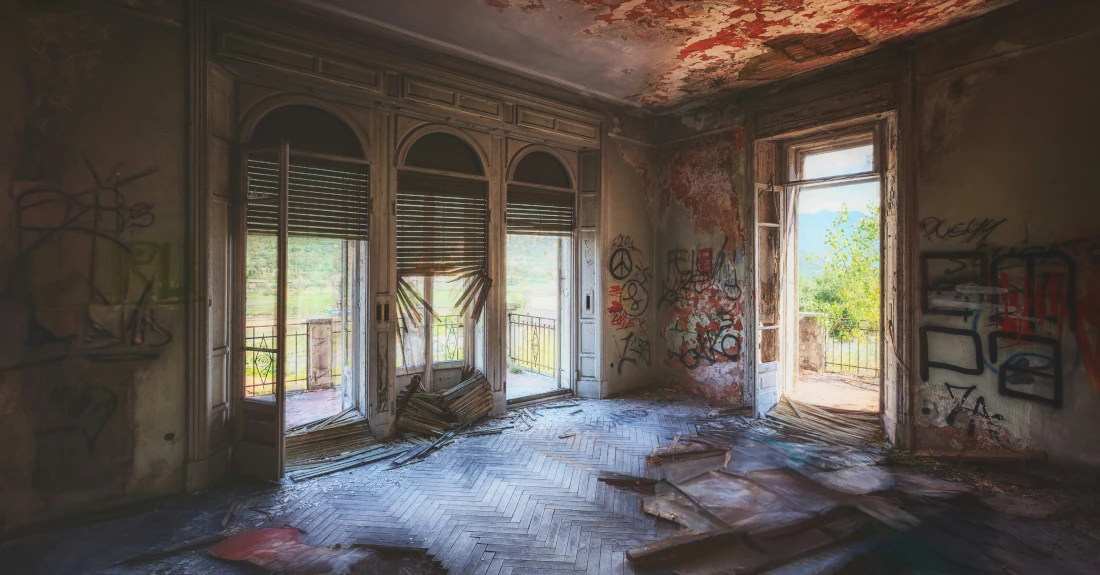Rooms of Memory
2025-Apr-01 • Sofia Ziegler

Memory arranges itself like an anatomy textbook: here is the heart (a willow tree, planted for a dead girl), here are the bones (a playground race, a naming ritual), here is the skin (shame, always shame). I wake with the taste of metal in my mouth, pressing Google Earth's bright eye against my childhood playground at 3 AM, bourbon making the screen liquid, searching for proof: yes, the willow still stands. Yes, this happened. Yes, I was there.
Kiko died of brain cancer that year, the tumor blooming inside her skull like some horrible flower. I hadn't invited her to my birthday party, but she came anyway, silver stars on wrapping paper, her mother fluttering at the doorway, awaiting rejection, pleading in her eyes. Later, they planted the willow tree for her, and later still, I would hide beneath it after the race—after Kelsey distributed places like the ordained.
The playground stretched like a kingdom, bounded by chain-link fence and teacher supervision. Swing sets stood sentinel, their worn chains squeaking as children pumped their legs to fly. The metal slide burned bare legs—a lesson in physics and pain. Behind it all, the red brick school building cast long shadows.
Gabby was my anchor that day, her presence solid as the stone walls of her suburban castle. Her home had two living rooms: one a museum of adult restraint with untouched couches and Aubusson carpets, the other our sanctuary where we could imagine worlds beyond our own. She was my first friend to understand words' true weight, conjuring meaning from black marks on a page long before we'd learned to read.
We would steal away to her sister's turret room, where curved walls bent reality into something more enchanted. There, she would trace her finger beneath each word like a spell, each syllable a gift freely shared. In those moments, the world beyond the pages dissolved, and I believed in stories' power to transport us.
But childhood is a landscape of shifting alliances. I could feel Gabby drifting toward Kelsey, drawn by an invisible force as inevitable as gravity. Kelsey, already being sculpted into an athlete, whose soccer trophies lined her walls and whose Barbie Jeep commanded her manicured lawn. Her mother, eternally distant, dressed in tennis whites, dispensing baby carrots and validation with equal precision.
I always glanced toward the space by the lunchroom door where Kiko had watched from her wheelchair. Memory preserved her there: head wrapped in pristine gauze, a scarf barely hiding the lightning-strike scar across her skull. She would clutch her small brown bear—a hospital gift shop's promise of bravery—watching us with eyes that held knowledge we couldn't bear.
The race began with a shout. Sneakers pounded pavement, ponytails swinging in autumn air. Kelsey led from the start, blond hair streaming like a victory banner. Gabby followed, face set with determination. When it ended, Kelsey stood at the center of our circle, flushed with victory and the casual authority of the perpetually chosen.
She began distributing places like royal favors: "Gabby, you were second," she proclaimed. "Elena, third..." The list continued, each name a brick in the wall of belonging. I stood there, waiting, understanding with a clarity that felt like nausea that no name was coming. This omission was a message: You do not exist in this world we are creating.
I retreated to the willow tree, its branches offering sanctuary. A green curtain between me and the others. In that stillness, I glimpsed Kiko in my mind's eye, understanding what it meant to exist outside Kelsey's carefully ordered world.
I remembered my first sleepover at Gabby's—excitement giving way to night's anxiety. Shadows pooled in corners, the urge to go home hammering at me. Gabby's mother, wrapped in Chanel No. 5, offered warm milk. "It's hard the first time," she said, a simple truth that steadied me.
That comfort now felt like smoke slipping through my fingers. Gabby had chosen Kelsey, and I faced the harsh truth that what I thought was solid was, in fact, fragile. I recalled afternoons spent tiptoeing around her golden retriever and tabby cat, those moments of warmth now feeling painfully distant.
Not long before, I had sat beside Kiko on the steps, transforming cheese wax into tiny figures. With just a few words, we created miniature worlds—tiny sculptures with punctured eyes and smiles. Kiko's quiet joy made her illness momentarily invisible. Yet impatience tugged at me, pulling me back to the playground's rhythms. I balled up my sculpture, racing back to play; how easily we could slip away from each other.
From my hiding place beneath the willow, I understood something about power—how it flows through inclusion and exile, how it lives in the spaces between words, in the names left unspoken. I was both victim and perpetrator in this dance, my own exclusion perhaps a cosmic justice for the ways I had looked past Kiko.
The school had dedicated the willow tree the spring after Kiko's passing. Our principal spoke of courage and memory, but his words felt distant, too light to capture the weight of an empty classroom chair. Kiko had become more symbol than person—a whispered story about mortality's arbitrary cruelty.
The willow tree still stands now, grown large enough to have held us all, its branches heavy with years of memories. It stands as a monument not just to Kiko, but to all the small cruelties and quiet heartbreaks that shape us. Perhaps that's what the willow's shadows taught me—that invisibility comes in many forms, and the deepest scars are inflicted through simple inaction, through the quiet practice of looking away.
Thank you, Sofia. A wistful and contemplative story. Really enjoyed it.
This is remarkably effective in rendering these types of pain. I can't quite account for why-- it's as if I can't see the brush strokes.
Relatable and smooth. Thank you!